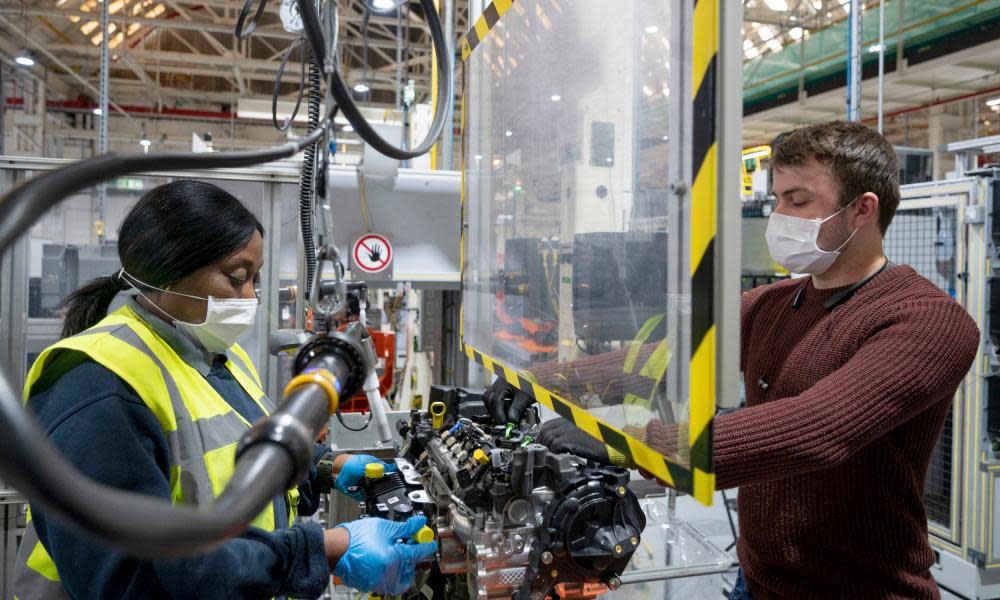UK manufacturing leaders call for emergency bailout

Manufacturing industry leaders have called on the government for an emergency bailout as the coronavirus outbreak forces factories across Britain to an effective standstill.
Sounding the alarm as Covid-19 crushes production levels and puts growing numbers of firms on the brink of collapse, the industry group Make UK said ministers needed to step in with direct state support to ensure the short-term survival of firms.
default
Britain’s foremost manufacturing group – which represents 20,000 companies of all sizes in engineering, manufacturing, technology and the wider industrial sector – said highly skilled jobs and critical supply chains across all regions of the country were at risk without direct support from the state.
The request comes as the chancellor, Rishi Sunak, considers using an emergency budget this summer to speed Britain’s economic recovery as lockdown measures are lifted. Such is the crisis gripping much of industry, The Sunday Times reported that the chancellor is working on plans for a set-piece spending event in parliament during the week of 6 July.
Sunak could use an emergency budget this summer as part of broader plans alongside No 10 to revitalise the economy, as the country slowly emerges from harsh controls on business and social life.
However, it is understood the chancellor could announce additional measures to support jobs and growth without needing to stage a full budget before the autumn.
It emerged last weekend that the Treasury had drawn up plans for the taxpayer to step in and rescue struggling companies to prevent a wave of job losses in sectors hardest hit by the coronavirus crisis.
Related: UK manufacturers planning tens of thousands of redundancies
Under the plan named Project Birch, the government would support companies as a last resort.
Make UK said the extent of the damage caused by the coronavirus crisis and lockdown measures was so widespread that failure to provide direct support this year could drive companies to the wall. Urging the government to step in, it said firms would need help to service debts they had accumulated during the crisis, and that firms in aerospace, automotive and steel would benefit most from direct aid.
Bailouts could take the form of equity stakes in struggling firms with tough conditions to ensure the best use of public money. An alternative option could be to extend the government’s loan guarantee schemes.
Ministers have come under pressure from Labour and campaigners to ensure government support comes with obligations, including bans on dividends, big executive bonuses and forcing companies to meet environmental targets.
Annaliese Dodds, the shadow chancellor, said manufacturing firms were often anchors of their local economies and the government needed to take a more strategic approach to supporting the industry.
“Equity support must be linked to supporting employment, adhering to environmental requirements, and delivering long-term value for money by preventing short-term dividend payments, share buybacks, and poor tax practice,” she said.
Other major countries have taken such an approach, including France, where Air France has been forced to cut back its domestic routes if train journeys could be used as an alternative in exchange for a €7bn (£6.3bn) government bailout.
Business surveys show UK factory output has plunged the most since comparable records began more than two decades ago. The number of cars made last month – one of the country’s key industrial sectors – plunged by 99.7% in April, with just 197 cars rolling off production lines across the country.
With the government planning to scale back its emergency furlough support scheme from August, Make UK said the scale of the damage meant many firms would not be able to take people off furlough and would resort to substantial redundancies.
Stephen Phipson, chief executive of Make UK, said: “They have now been driven to the cliff edge by the nature of this crisis and may not survive without direct government intervention.”
A spokeswoman for the Treasury said it had already provided an unprecedented package of support, including more than £40bn in loans and guarantees, cash grants to three quarters of a million firms and paying the wages of 8.4 million furloughed workers.
“The engineering and manufacturing industry will be able to draw upon these measures to help them through the coronavirus pandemic, as well as time to pay flexibilities with tax bills and VAT deferrals,” she said. “We continue to regularly engage with businesses across all sectors.”


